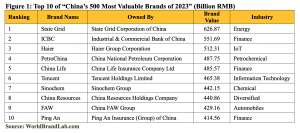
World Brand Lab Released 'China's 500 Most Valuable Brands of 2023'
In 2023, China's 500 Most Valuable Brands reached a total value of 34,331.18 billion RMB, marking an increase of 3,358.37 billion RMB (10.84%) over the previous year. Dr. Steve Woolgar, Chairman of the World Brand Lab and Emeritus Professor of Marketing at the University of Oxford, remarked, "Over the past two decades, I've witnessed the swift growth of Chinese brands, many of which have already attained significant global influence. Such brands include State Grid, Haier, China Life, Sinochem Group, China Resources, China Southern Power Grid, China Huadian Corporation, Wuliangye, Tsingtao Brewery, Beidahuang Group, XCMG, Tongwei, Bosideng, Feihe, Power Dekor, Hengli, DoubleStar, JOMOO, and GCL, to name a few." This marks the 20th year since World Brand Lab produced its Chinese brand report, with the minimum entry threshold increasing from 500 million RMB in 2004 to 3.53 billion RMB in 2023, while the average value of the top 500 brands grew from 4.94 billion RMB to over 68.66 billion RMB, an increase of 1289.08%.
Based on analysis by World Brand Lab, the competitive strength of a region is primarily dependent on its comparative advantages, with brand benefits directly impacting the formation and development of such advantages. Brands serve as a symbol of regional development and drive economic growth, thus promoting the rise of local brands. The regional distribution of this year's "China's 500 Most Valuable Brands" report ranks Beijing first with 87 brands selected, mostly due to its headquarters of central enterprises having strong profitability. Guangdong and Shandong follow closely with 84 and 45 brands respectively, positioning them in second and third place. Brands listed may be divided into national and global brands according to their scope of influence, with 437 brands having national influence, accounting for 87.40% of the listed 500 brands, and 63 brands boasting global influence, which represents a slight increase from last year.
Dr. Elie Ofek, a marketing professor at Harvard Business School, emphasizes that the emergence of Artificial Intelligence (AI) has opened up novel and significant prospects for rebranding. It is crucial for future entrepreneurs to delve into the ways in which brand management is being reshaped by intelligent technologies like machine learning and AI. AI is more than just a platform for boosting efficiency - the technology can shape a company's brand identity and strengthen long-lasting customer relationships. Therefore, creating an organized framework that identifies and locates the various roles AI can play in brand management is vital for the success of modern businesses in diverse industries.
According to Dr. Jennifer Aaker, a professor of marketing at the Stanford Graduate School of Business, most of today's technology is focused on generating short-term happiness. However, she believes that AI should be harnessed to enhance our sense of meaning on a deeper level, rather than just superficial satisfaction. To achieve this, we need to ask crucial questions about what it means to be human, how to build AI that fosters trust, and how to instill values like human dignity, growth, curiosity, wisdom, and empathy. Meanwhile, Dr. David A. Aaker, an emeritus professor at the Haas School of Business at the University of California, Berkeley, acknowledges the critical role of AI in corporate marketing and branding. He emphasizes that AI enables more personalized interactions with stakeholders, but brands must also possess the necessary expertise to decipher and address the complexities of data-driven software.
Dr. Ravi Dhar, a professor of management and marketing at the Yale School of Management, highlights that the metaverse can impact brand strategy in four key ways. First, brands can leverage user experiences and testimonials to build trust and awareness. Second, brands can partner with creators and influencers who align with their target audience. Third, brands can create virtual experiences that deliver on their promises. Finally, brands can offer value through virtual goods. As the use of AI-powered tools like ChatGPT continues to grow, brands must also confront the challenge of disinformation. The scale, scope, and speed of disinformation is likely to increase exponentially with AI, and brands need to carefully consider how to respond to avoid negative outcomes.
Dr. Haisen Ding, CEO of World Executive Group and World Brand Lab, observes that the exponential growth of artificial intelligence and Web 3.0 is disrupting brand building practices around the world. This unprecedented era of technological upheaval offers both Chinese and foreign brands, regardless of their size or status, an equal opportunity to innovate and thrive. By harnessing the power of AI, companies can revolutionize their approach to brand building and marketing. For instance, AI algorithms can analyze massive amounts of customer data, predict patterns and trends in consumer behavior, and create highly personalized marketing messages and promotions tailored to individual customers.
World Brand Lab is an internationally recognized brand value research institute that is wholly owned by World Executive Group, a leading digital business and strategy consulting firm. The institute was co-founded by Nobel Laureate Robert Mundell, who served as its first chairman. Its research is widely used to evaluate intangible assets during mergers and acquisitions.
Jason Wang
World Brand Lab
+1 212-208-1429
email us here
Distribution channels: Banking, Finance & Investment Industry, Companies, Consumer Goods, Media, Advertising & PR, World & Regional
Legal Disclaimer:
EIN Presswire provides this news content "as is" without warranty of any kind. We do not accept any responsibility or liability for the accuracy, content, images, videos, licenses, completeness, legality, or reliability of the information contained in this article. If you have any complaints or copyright issues related to this article, kindly contact the author above.
Submit your press release
